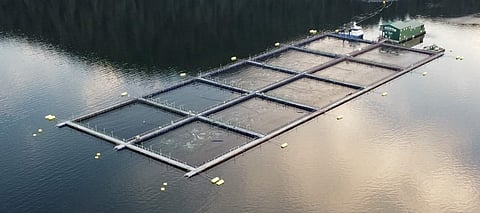

Minister Lebouthillier said that no more salmon farms will be closed in British Columbia for the moment but no more licenses will be issued either. The BC Salmon Farmers Association asked DFO for "thoughtful, evidence-based licensing decisions."
Photo: BC Salmon Farmers Association (BCSFA).
"We are not shutting down any more farms, but we are not giving licenses to open more for the moment." According to the social media post by Emmy Award-winning food and travel journalist and seafood expert, Michael-Ann Rowe, these were the words of Diane Lebouthillier, to her question about what is happening with fish farms in BC, asked during one of the meetings with stakeholders the Minister had during her visit to the United States to promote Canada's sustainable seafood products.
These statements virtually coincided in time with the close of the consultation period - which ended on March 8 - on the changes proposed by Canada's Department of Fisheries and Oceans (DFO) to the Marine Finfish Aquaculture Conditions of Licence, which will be implemented as of July 1, 2024. Current marine finfish aquaculture licenses in British Columbia will expire on June 30, 2024.
As WeAreAquaculture reported last month, among its proposals, DFO's review included the possibility of extending fish aquaculture licenses length for up to six years while applying stricter controls on the monitoring and treatment of sea lice.
Following these words by the Minister and the close of the consultation period, the BC Salmon Farmers Association (BCSFA) has issued a statement indicating that the re-issuance of salmon farming licenses presents what the association considers an opportunity for transition. "DFO now has a real opportunity to provide stable conditions supporting ongoing progress through thoughtful, evidence-based licensing decisions," the BCSFA said.
Canada's Minister of Fisheries and Oceans, Diane Lebouthiller, has been on a ten-day visit - March 2-12, 2024 - to the United States to promote Canadian fish and seafood workers' interests and ocean protection. That visit took her to New York, Washington, Maine, and, finally, to Boston, Massachusetts, where she co-led the Canadian delegation at Seafood Expo North America 2024 (SENA).
The visit was part of the Team Canada strategy on engagement with the U.S. The two countries have one of the closest and most important trading relationships in the world, based on long-standing shared values and deeply integrated supply chains. The United States is Canada's largest export market for seafood products, accounting for 64% of its exports, valued at $4.9 billion annually.
Another fact gives an idea of what that means: in 2023, Canada exported over $7.6 billion worth of fish and seafood to 115 countries. As a result, the Government of Canada is committed to stimulating innovation and sustainability in the sector to meet the growing demands of both the U.S. and global markets.
"In Canada, we have a well-regulated, scientifically-monitored and legally-enforced industry that’s economically prosperous, environmentally sustainable and socially responsible. It’s also an industry that benefits from a highly skilled workforce and constant innovation," DFO stated following Lebouthiller's presence at SENA 2024.
Precisely, salmon is among Canada's most valuable trade species, so the question that seafood expert Michael-Ann Rowe asked the Minister a few days earlier during her visit to the Fulton fish market in New York, where she met with interested parties, makes perfect sense.
"What is happening with the fish farms in BC? " the journalist asked. "We are not shutting down any more farms, but we are not giving licenses to open more for the moment," Lebouthiller replied, adding, "Healthy open net farming solutions need to be maintained at this time."
On the same day that Seafood Expo North America closed, and Minister Lebouthiller's visit to the U.S. ended, the BC Salmon Farmers Association issued a statement asserting that with licenses held by B.C.'s salmon farming sector expiring at the end of June 2024, Fisheries and Oceans Canada has "an opportunity to thoughtfully consider the re-issuance in light of transition commitments."
Commenting on the DFO review proposals, the BCSFA said that while past performance related to impacts and bycatch is important context, the situation has evolved significantly in recent years through new agreements, standards, and technologies aimed at minimizing interactions and risks to wild Pacific salmon.
"Over the past 20 years, salmon farming companies on the coast of British Columbia have made substantial progress in minimizing incidental catch and environmental impacts and engaging with First Nations through innovations, new technology and collaborations," said Brian Kingzett, Executive Director of the BC Salmon Farmers Association. "Strict government regulation and third-party certification ensure farming practices protect wild salmon and other wildlife," he added.
BC salmon producers acknowledge that concerns remain, but also insist that the data show impacts are low and wildlife populations remain healthy according to the best available science. The BCSFA thinks that, with strict new agreements and regulations now in place, the way forward must carefully consider both environmental and socio-economic priorities to achieve balanced outcomes for all.
According to the BC Salmon Farmers Association, even when past impacts must not be overlooked, it must be recognized the situation has improved thanks to cooperation between First Nations, Government, and industry. As such, the BCSFA considers DFO now has a real opportunity to provide stable conditions supporting the ongoing progress of the industry through what they have called "thoughtful, evidence-based licensing decisions." There are many coastal livelihoods at stake, so, in its view, achieving balance is critical to transitioning in an economically and environmentally responsible manner.
"Everyone working on the oceans must take care to minimize impacts from their business, whether it be shipping, tourism, commercial and sport fisheries, or aquaculture," Kingzett stated in response to the Government of Canada's concern about the long-term sustainable management of aquatic resources. "The aquaculture sector – working with First Nation partners and third-party experts – takes this responsibility very seriously and, learning from past interactions with wildlife, has been implementing new technologies and methods that effectively reduce or eliminate impact on wildlife."
